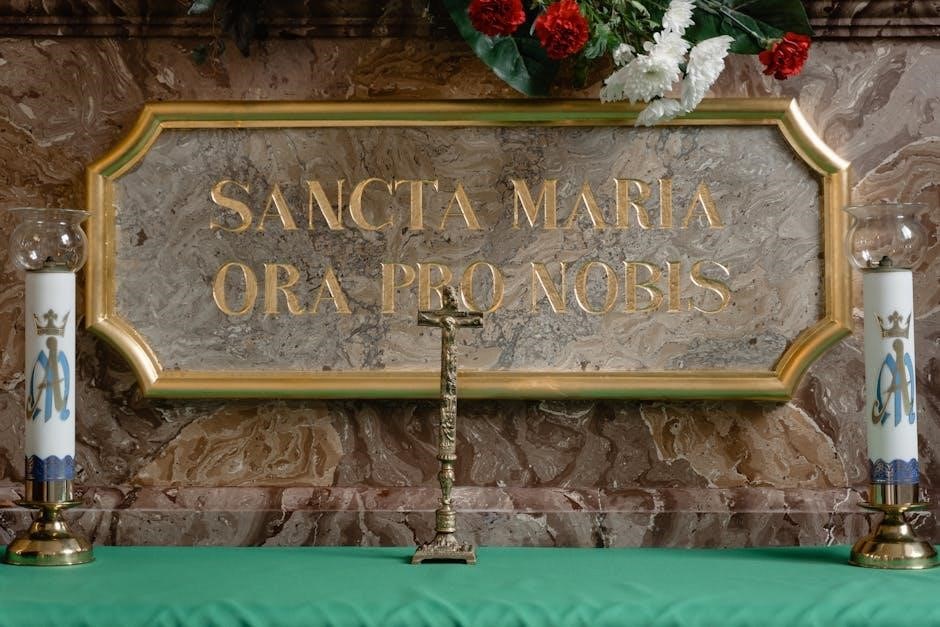The Litany of the Holy Name of Jesus is a formal Catholic prayer venerating the Sacred Name of Jesus, approved for public and private devotion, carrying a partial indulgence. It is structured with various titles and attributes of Jesus, each followed by a plea for mercy, emphasizing the power and reverence of His Name in Catholic tradition.
1.1 What is the Litany of the Holy Name of Jesus?
The Litany of the Holy Name of Jesus is a formal Catholic prayer dedicated to venerating the Sacred Name of Jesus. It consists of a series of invocations and supplications, each addressing Jesus by various titles and attributes, such as “Jesus, Son of the Living God” and “Jesus, Splendor of the Father.” Each invocation is followed by a plea for mercy, reflecting the devotion to the Holy Name as a source of spiritual strength and salvation. This litany is one of the approved prayers in the Catholic Church, often recited for personal devotion or within liturgical celebrations.
1.2 The Importance of the Holy Name in Catholic Devotion
The Holy Name of Jesus holds profound significance in Catholic devotion, symbolizing God’s salvation and mercy. Invoking the Name of Jesus is believed to bring spiritual strength, protection, and grace. The Litany of the Holy Name emphasizes this reverence, offering a structured way to honor and seek mercy through His divine attributes. Catholics believe that repeating the Holy Name devoutly fosters intimacy with Christ and shields against evil. This devotion is rooted in scripture and tradition, making the Holy Name a central focus of prayer and worship in the Catholic faith, reflecting its power to transform and sanctify lives.
Historical Background of the Litany
The Litany of the Holy Name of Jesus originates from early modern Catholic devotion, parallel to the Sacred Heart tradition, emphasizing the Holy Name’s transformative power and mercy.

2.1 Origins of the Devotion to the Holy Name
The devotion to the Holy Name of Jesus emerged in the early modern period, alongside the Sacred Heart devotion, reflecting a deep reverence for the power and sanctity of Jesus’ Name. This practice, rooted in Scripture and Tradition, emphasizes the transformative power of invoking Jesus’ Name with faith. The Litany, as part of this devotion, lists various titles and attributes of Jesus, each followed by a plea for mercy, highlighting His role as Redeemer and Savior. This tradition underscores the belief that the Holy Name is a source of spiritual strength and divine grace.
2.2 The Role of Popes in Promoting the Holy Name
Popes have historically played a significant role in promoting devotion to the Holy Name of Jesus. Through papal decrees and encyclicals, they have encouraged the faithful to venerate the Sacred Name, emphasizing its power to bring spiritual transformation and grace. The Litany of the Holy Name was formally approved by the Catholic Church, reflecting papal endorsement of this devotion. Popes have also granted indulgences to those who pray the Litany, further highlighting its importance in Catholic spirituality. This papal support underscores the enduring significance of the Holy Name in fostering a deeper connection with Jesus Christ.

Structure and Content of the Litany
The Litany of the Holy Name of Jesus is a structured prayer with invocations and responses, listing over 30 titles and attributes of Jesus, seeking mercy and deliverance.
3.1 The Components of the Litany
The Litany of the Holy Name of Jesus is composed of invocations and responses, creating a rhythmic dialogue of devotion. It begins with a plea for mercy, followed by titles and attributes of Jesus, such as “Son of the Living God” and “Splendor of the Father.” Each invocation is met with the response “have mercy on us,” emphasizing the seeker’s humility. The litany concludes with a prayer to the Blessed Trinity, ensuring a structured and reverent flow. This format fosters a deep connection with the Holy Name, making it accessible for both private and communal devotion.
3.2 Key Titles and Attributes of Jesus in the Litany

The Litany of the Holy Name of Jesus includes over 50 titles and attributes of Jesus, such as “Son of the Living God,” “Splendor of the Father,” and “Brightness of Eternal Light.” These titles reflect His divine nature, redemptive mission, and sanctifying grace. Each invocation highlights a unique aspect of Jesus’ character, such as His role as Savior, Teacher, and Shepherd. The litany also emphasizes His power to deliver and protect, with attributes like “King of Kings” and “Stronghold of the Saved.” These titles are not only devotional but also doctrinal, reinforcing Catholic teachings about Jesus’ identity and salvific work.

Spiritual Benefits of the Litany
The Litany of the Holy Name of Jesus offers mercy, forgiveness, and protection from evil, fostering spiritual growth and a deeper connection to Jesus’ divine attributes and salvific power.
4.1 Seeking Mercy and Forgiveness
The Litany of the Holy Name of Jesus is a powerful prayer for seeking God’s mercy and forgiveness. By invoking Jesus’ sacred titles, such as “Son of the Living God” and “Splendor of the Father,” the faithful humbly ask for pardon and grace; The repetitive pleas for mercy emphasize the profound need for divine forgiveness in a fallen world. This litany not only expresses contrition but also reaffirms trust in Jesus’ redeeming power, offering a spiritual pathway to absolution and closer union with God. Its structure encourages believers to reflect on Jesus’ attributes while seeking His compassionate mercy.

4.2 Protection from Evil and Spiritual Growth
The Litany of the Holy Name of Jesus offers a powerful means of seeking protection from evil and fostering spiritual growth. By invoking Jesus’ sacred titles, such as “Brightness of Eternal Light” and “Son of the Living God,” believers pray for deliverance from evil influences. The litany strengthens faith, providing a spiritual shield against darkness. It also nurtures growth in virtue, encouraging believers to reflect on Jesus’ attributes and draw closer to God. This prayer not only safeguards against evil but also deepens intimacy with Christ, promoting a life rooted in His grace and truth.

Practical Use of the Litany
The Litany of the Holy Name of Jesus can be recited daily for personal devotion or during liturgical celebrations, fostering spiritual intimacy with Jesus and communal worship.
5.1 Incorporating the Litany into Daily Prayer

Incorporating the Litany of the Holy Name of Jesus into daily prayer enriches spiritual life by offering a structured yet intimate way to invoke Jesus’ mercy and attributes. Catholics can recite it during morning or evening devotions, using it as a powerful tool for reflection and petition. The litany’s rhythmic structure makes it suitable for personal or family prayer, fostering a deeper connection with Christ. Regular recitation helps cultivate devotion, providing strength and grace in daily life, while its accessibility in PDF format ensures ease of use for individuals seeking to integrate it into their spiritual routines.
5.2 The Role of the Litany in Liturgical Celebrations
The Litany of the Holy Name of Jesus is a powerful tool in liturgical celebrations, fostering communal devotion and unity. It is often recited during Masses, especially on the Feast of the Holy Name of Jesus, to invoke divine mercy and reflect on Christ’s attributes. The litany’s call-and-response structure engages the congregation, creating a shared spiritual experience. Its inclusion in liturgical events emphasizes the significance of Jesus’ Name, enriching the celebration and deepening participants’ connection to their faith. This sacred prayer enhances the liturgy, offering a meaningful way to honor and glorify the Holy Name of Jesus collectively.
Availability of the Litany in PDF Format

The Litany of the Holy Name of Jesus is widely available as a free PDF download on platforms like Scribd and various Catholic websites, enabling easy access for devotion.

6.1 Where to Find the Litany of the Holy Name of Jesus PDF
The Litany of the Holy Name of Jesus is readily available in PDF format on various Catholic websites and platforms. Websites like Scribd and YUMPU offer free downloads of this prayer. Additionally, Catholic diocesan websites, such as eucharisticrevival.dor.org, provide accessible versions for personal and communal use. These PDFs are designed for easy printing and sharing, ensuring widespread accessibility for devotees seeking to deepen their spiritual practice through this sacred litany.
6.2 Differences Between Various PDF Versions
Various PDF versions of the Litany of the Holy Name of Jesus may differ in formatting, language, and additional content. Some versions include over 50 titles and attributes of Jesus, while others are more concise, listing around 30. Certain PDFs incorporate scriptural references or brief reflections, enhancing devotional use. Others may omit the Latin text or include optional prayers for personalization. Despite these variations, all versions retain the core structure and spiritual intent of the litany, focusing on seeking mercy and praising Jesus’ divine attributes. These differences cater to diverse devotional preferences while preserving the prayer’s traditional essence.
